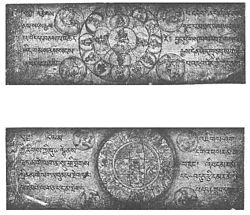Tibetan Book of the Dead
The Tibetan Book of the Dead is a religious text from Tibet, written as a guide for persons attending someone who is dying or recently dead, to bring comfort and " ". It includes prayers, instructions for both dying persons and their attendants, and descriptions of the afterlife. (Roman Catholicism has comparable rituals, called or Last Rites.) The book has been translated into many languages, including English.
Adaptations
In the 1960s, professors Timothy Leary, Ralph Metzner and Richard Alpert (later known as Baba Ram Dass) collaborated on a book titled The Psychedelic Experience, which adapted portions of the Book of the Dead as a guide for use in LSD experiences. They hoped to give users of LSD a simulation of death and , to "liberate" them from past problems or mistakes in their lives. Many persons did have positive results from their book. Others pursued it like a , and were not helped or changed for the better.
John Lennon of The Beatles adapted the adaptation in turn, using many of the book's ideas for his song "Tomorrow Never Knows". He later The Psychedelic Experience, calling it "that stupid book of Leary's," but his song spread its influence. This book has real life experiences between life and death situations.
Tibetan Book Of The Dead Media
Manuscript of the Bardo Thodol.
Centuries old Zhi-Khro mandala, a part of the Bardo Thodol's collection, a text known in the West as The Tibetan Book of the Dead, which comprises part of a group of bardo teachings held in the Nyingma (Tibetan tradition) originated with guru Padmasambhava in the 8th century.
Tibetan Thanka of Bardo. Vision of Serene Deities, 19th century, Guimet Museum


